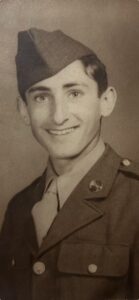 A Soldier’s Story
A Soldier’s Story
By Lou Mindar
Author’s Note
Throughout his life, my dad, Louie Mindar, rarely spoke about his time in the Army during World War II. We knew that he had served in the troops that liberated the Buchenwald and Dachau concentration camps, but we didn’t know any of the specifics. And I had heard bits and pieces about a story that involved German fighter planes strafing a hillside while he ran, trying to stay ahead of the bullets, but the facts were murky and he didn’t seem to want to clarify them. I’d occasionally ask, but he was never very forthcoming.
Then, in 2016, when Dad was 90 years old, I decided to ask again about his experience fighting in Europe. He had just received a newsletter from his old unit—the Rolling W—in the mail, and I used the stories in the newsletter to prompt our conversation. To my surprise and utter joy, Dad began talking about his time in the Army.
As you might imagine, his recollections were not as detailed as they might have been years earlier, but he still remembered enough for me to take notes and to bring up other questions. When we were done, I had a timeline of his experiences, and enough details to lead to further research.
Even so, I had no idea what I was going to do with the information. I kept telling myself that someday, I’d write Dad’s story. Initially, I thought it would be while he was still alive. But sadly, he passed away in December 2019 at the age of 93, and I still hadn’t done anything with the information that he and my research had provided. In fact, I still wasn’t sure what to do with the information.
Several years went by, and I continued to think about writing Dad’s story, but that’s all I did, lots of thinking but no writing. Initially, I thought I might write a biography of Dad’s war years, but there were still a lot of blanks in his story, and if I was going to write a biography, I wanted it to be accurate. And if I’m being honest, I wasn’t sure I was up to the task. I’m a fiction writer, and nonfiction is a muscle I haven’t trained.
Finally, I decided to write Dad’s story as fiction, but I wanted to make it as realistic and accurate as possible. I finally put pen to paper (or fingers to keyboard) in early 2025, the 80th anniversary of the Allied victory in World War II, as well as 80 years since Dad fought, along with thousands of other brave souls, across Europe and against fascism. My goal was to have the story—which turned into a novella—done by Veterans Day 2025.
I’m proud of my dad’s service in World War II, and I view him as a hero. But I have to admit that Dad’s experience wasn’t much different than the nearly 16 million other Americans who served in the military during that time. They are all heroes and the world owes them a debt of gratitude we can never fully repay. As journalist Tom Brokaw said, theirs is the greatest generation.
As I mention in the story, Dad was the fourth of four brothers to serve their country during World War II. His brothers Emil and Alex served in the Pacific, and Dan served in Europe. All four brothers served with distinction, and by the grace of God, all four returned home after the war. I want to say they returned home no worse for wear, but that’s not true. They brought home scars none of us could see, and they hid them pretty well. But no one can go through what they went through, and see what they saw, and not be impacted. They lived the rest of their years as productive citizens, but I can only imagine the toll the war took on them.
It is because of their sacrifice, and the sacrifice of millions of others, that we live free today. We should always remember their sacrifice, and we can best honor it by making sure that future generations do not have to endure what they endured. For them and for future generations, we must remain vigilant in our defense of our country, our constitution, and our democracy. We owe them at least that much.
With a full and grateful heart,
Lou Mindar
November 2025
Dedication
For Dad, my hero.
Chapter 1
The metal chains that held the swing seat to the bar above were cold in Louie’s hands. He pumped his legs until the seat lifted and the world tilted, the ground rolling up to meet him and slipping away again. Beyond the narrow strip of grass, the street was quiet except for an Oberweis Dairy truck that rattled by and kept going down High Street.
Pigeon Hill Park was no bigger than a postage stamp, two swings, a paint-flaked bench, and a bald patch where kids wore the grass to dirt. It was late spring. Buds had gone to leaves, and the snow that had made a gray crust of everything just a few weeks earlier was now just a memory.
Louie’s sister, Florence, sat on the bench with her knees together and her hands folded over her purse, watching him like she always had, counting the beats of his swinging the way a mother counts the breaths of a child when they sleep. She was only four years older than him, but since their mother died when Louie was just four, she’d been his guardian, a kind of hybrid sister-mother. Louie dragged his rubber soles and let the swing slow until it creaked to a stop. He eased himself off, his face cold from the small wind he’d made.
“I wondered if you’d come out today.” He shoved his hands in his jacket pockets, his feet toeing at the dirt. “It’s kind of cold.”
“Better than sitting in the house.” Florence gave a small smile. “What are you up to today, Louie?”
He glanced across the street. Laundry flapped from a backyard line, a man watered a stoop with a tin can. The neighborhood was the same as ever: Romanian and Hungarian voices; church bells on Sundays from St. Michael’s, St. George’s, or St. Joseph’s; old men playing cards and rolling their own cigarettes.
Their parents had come to the United States on a boat in 1904, she a girl of ten and he a boy of sixteen, strangers standing on the same deck and not yet knowing each other. Ellis Island first, then a hopscotch west to Michigan, and finally to Aurora, Illinois, where the factory chewed up daylight and spit out pay envelopes on Fridays. In 1915, they married at St. Michael’s and immediately started a family. Nine kids in all, seven that made it to adulthood.
He swallowed. “I can’t just sit around anymore.”
“You’re always so restless.” Florence’s voice stayed gentle. “Emil, Alex, and Dan are already in the war. Isn’t that enough?”
Louie rubbed a thumb along the seam of his jacket pocket, his brother’s names seeming to change his focus. “Dan sent a letter last week,” he said. “Said the mud smells the same everywhere and the coffee’s never hot by the time it gets to you. Can you imagine that? Dan complaining about coffee.” He gave a quick laugh that sounded like the scrape of a match, then he returned his focus to what was eating at him. “Dan’s in Europe. Emil and Alex in the Pacific. Everyone’s doing something, except me. I’m stuck here in this park.”
“You’re just seventeen,” she said. “You know you can’t join until you’re eighteen.
“I’m almost eighteen,” he said. It wasn’t true, not even in the way a boy convinces himself time can be hurried along. His birthday was months off. The Army didn’t care about “almost.”
“There’s boys I know…Tommy Popp, he went down to Chicago last month and they shipped him out. He’s not any older than me. Well, not by much.”
“He’s eighteen and his mother cries every day.” Florence looked down at her hands, then out at the street. “And some boys don’t come back. You know that.”
He did know it. He knew it from the silence after the mailman passed a door, from the way windows went dark at dinnertime on houses where they used to laugh loud. He knew it from the radio. He knew it from the way their father sat in the kitchen after work, not looking anyone in the eye, the newspaper folded and refolded until the print smudged his fingers. Continue reading “A Soldier’s Story”

 I was talking to a friend recently and she said she was struggling with her creative projects because they weren’t turning out in the exact same way she had pictured them in her head.
I was talking to a friend recently and she said she was struggling with her creative projects because they weren’t turning out in the exact same way she had pictured them in her head. In 2024, as I was writing my most recent novel,
In 2024, as I was writing my most recent novel,  For the third year in a row, I read more nonfiction books than fiction. As a fiction writer, that causes me a little bit of angina. I love fiction and I want to read more. But there are also so many interesting things in the world to read about. What’s a reader to do?
For the third year in a row, I read more nonfiction books than fiction. As a fiction writer, that causes me a little bit of angina. I love fiction and I want to read more. But there are also so many interesting things in the world to read about. What’s a reader to do? 10.
10. 




 4.
4. 

 1.
1.  Seeing the cover of a new book for the first time is always exciting. It’s like putting a face to a character. The book has lived on paper as just words for months or years, but once the cover is ready, those words really come to life. It makes the book and the story it tells real.
Seeing the cover of a new book for the first time is always exciting. It’s like putting a face to a character. The book has lived on paper as just words for months or years, but once the cover is ready, those words really come to life. It makes the book and the story it tells real.
 It’s been a while since I published a book.
It’s been a while since I published a book.  I recently completed the final revisions to my latest book, A Thousand Ways Home. As I was nearing the finish line, I read the entire manuscript out loud. It’s a habit I’ve gotten into, whether I’m writing a blog post, a short story, or a novel.
I recently completed the final revisions to my latest book, A Thousand Ways Home. As I was nearing the finish line, I read the entire manuscript out loud. It’s a habit I’ve gotten into, whether I’m writing a blog post, a short story, or a novel. According to an article in The Atlantic magazine, the concept of the “great American novel” was dreamed up in 1868 by a little known writer named John William DeForest. The United States had just emerged from the Civil War, and DeForest recognized that the end of the war had ushered in a fundamentally different nation than had existed just a few years earlier.
According to an article in The Atlantic magazine, the concept of the “great American novel” was dreamed up in 1868 by a little known writer named John William DeForest. The United States had just emerged from the Civil War, and DeForest recognized that the end of the war had ushered in a fundamentally different nation than had existed just a few years earlier.